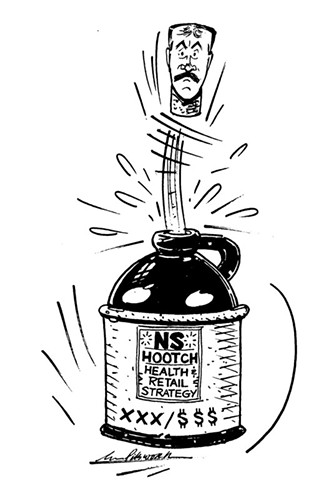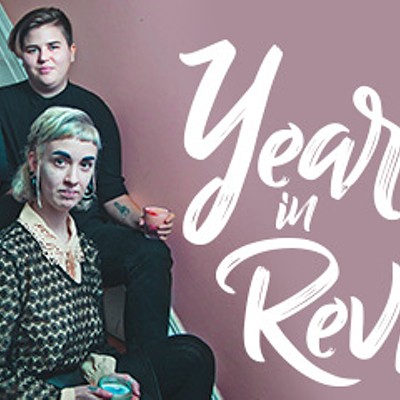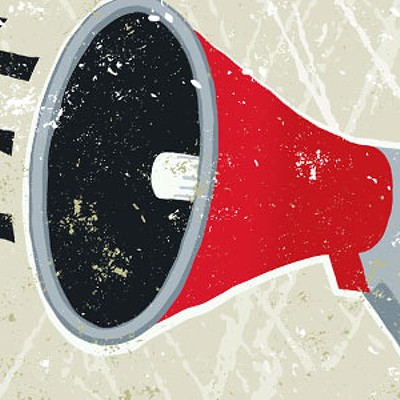It was hard not to feel a twinge of sympathy on August 29 as Barry Barnet, minister of health promotion, faced an onslaught of media questions over his plans to curb Nova Scotians' thirst for hootch. "One in five Nova Scotians who drink alcohol do so in a way that harmfully affects their own health and well-being," Barnet soberly told reporters. "This includes chronic disease, injury, crime, violence, risky sexual behaviour, and drinking and driving. It is estimated that harmful alcohol use costs our economy $419 million annually an annual average of 3,100 hospital admissions, 42,000 hospital days and an unnecessary 230 deaths." Well if that's so, we newshounds bayed, why had the province just relaxed booze restrictions allowing bars to stay open later, liquor stores to peddle grog on Sundays and diners to lug their own wine to local eateries? "This is about the future, not the past," Barnet answered uncomfortably. But we were now in full cry, hot on the scent of political hypocrisy. Why, we demanded, was the province expanding the number of convenience stores that sell booze, and why was the liquor commission pumping perfume into its some of its stores to boost sales? Yes, believe it or not, the aroma of French bread in the wine section at its Bayers Lake emporium, coconut in the rum aisles and the reek of cedar over by the whiskey. "It's about balance, about moving forward," Barnet replied. "Our past actions on tobacco show we're serious. Now we have to focus on all five elements of this strategy."
Unfortunately, those five elements, outlined in a glossy 10-page booklet, seem as woolly as unshorn sheep. They include "Community Capacity and Partnership Building" and "Communication and Social Marketing." And, oh yes, the Department of Health Promotion is commissioning a report on "Best Practices in Preventing Problematic Substance Abuse," establishing an "Advisory Committee to help set and initiate alcohol-related policy priorities" and undertaking "a benchmark survey of the cultural dynamics of alcohol consumption."
Barnet presented it as "the first provincial alcohol strategy of its kind in Canada." But if he really wants to wean drinkers off the bottle, he'll need more than a barrage of buzzwords to persuade his cabinet colleagues to go along. Thousands of jobs depend on the booze trade and hundreds of millions in income taxes, alcohol mark-ups, licensing fees and sales taxes flow into provincial coffers. Last year, the liquor commission alone contributed nearly $200 million, and no wonder. Since the Hamm government gave the NSLC a commercial mandate in 2001, business has been booming. Per capita consumption jumped 22 percent in the first four years and experts agree that as consumption rises, so do alcohol's social and economic costs.
Since more than three-quarters of adult Nova Scotians enjoy tippling, Barnet also faces political peril if he takes the most effective steps to reduce consumption. The book Alcohol: No Ordinary Commodity, which summarizes decades of international research, recommends what it calls the "best practices" to curb drinking. They include a strict government monopoly on liquor stores, reducing the number of outlets and the hours and days they're open (the exact opposite of what Nova Scotia is doing); levying alcohol taxes that keep pace with inflation (Canada's have failed to do so since 1991); implementing more frequent police spot checks with random testing of all drivers stopped, and graduated licensing for novice drivers similar to the program already in effect here. The book warns against relying on education and so-called "social marketing" (a fancy term for advertising), because it says study after study has shown they're not very effective. (So much for the next phase of the government's "Extreme Drinking" ad blitz aimed at 19- to 29-year-olds. It's called "Life After the Party," and is supposed to start this fall.)
Looks like Barry Barnet has a big job ahead. Mission improbable. Still, I'm hoping he succeeds. Hey Barry, here's to your health. Santé!
Don’t bottle it up. Email [email protected].
















